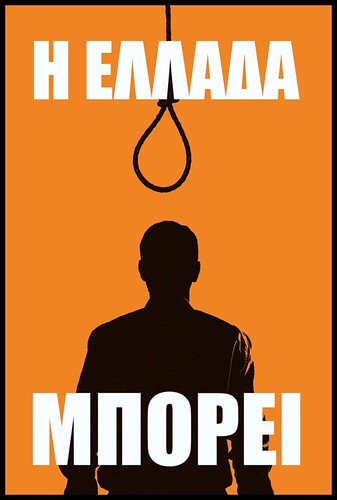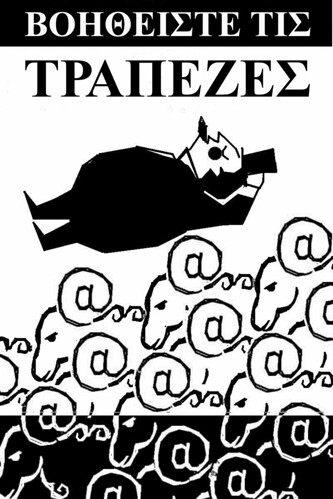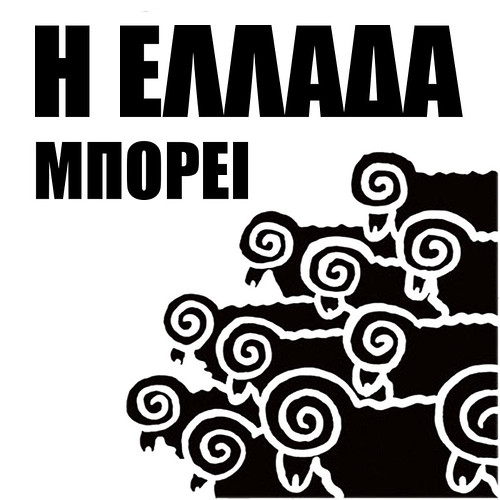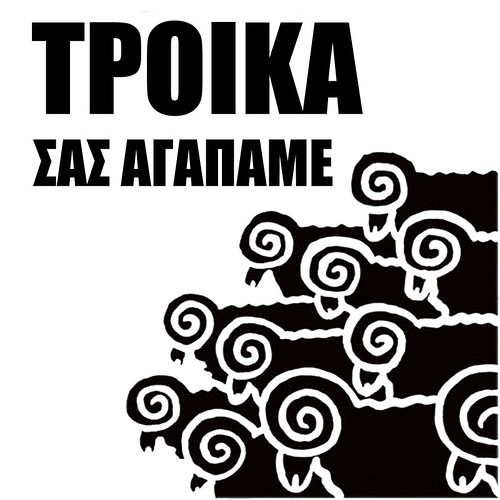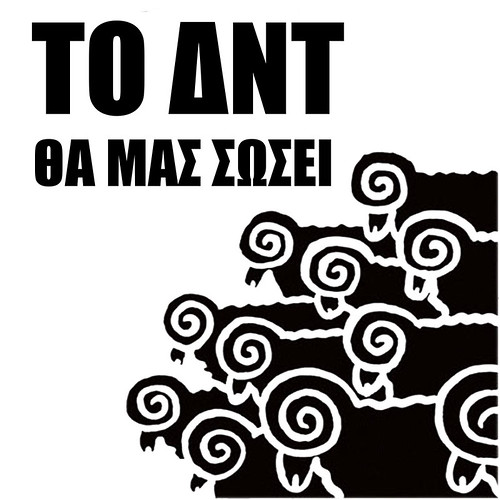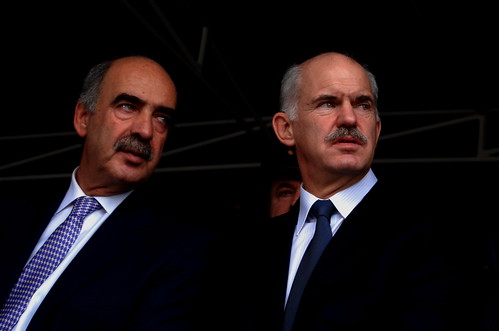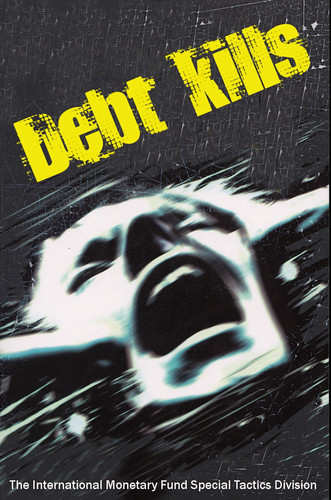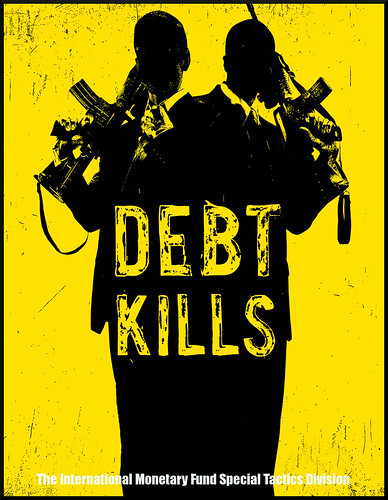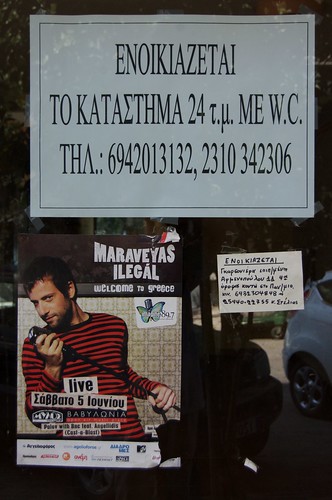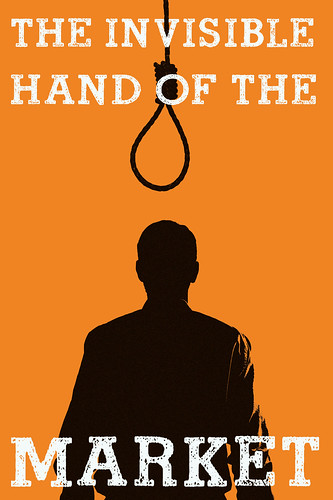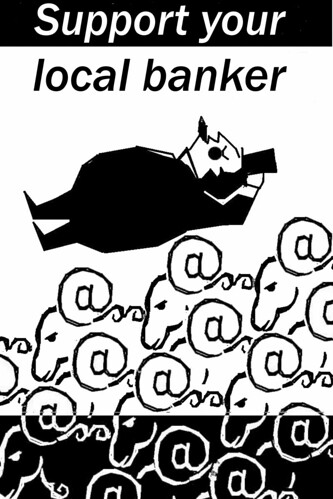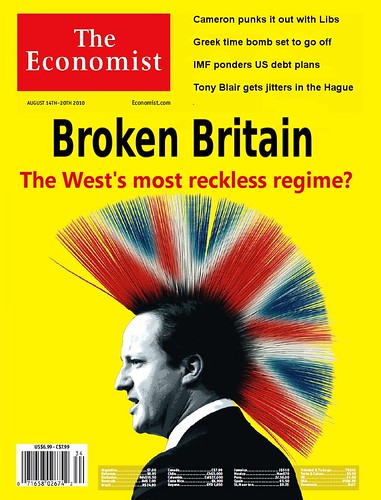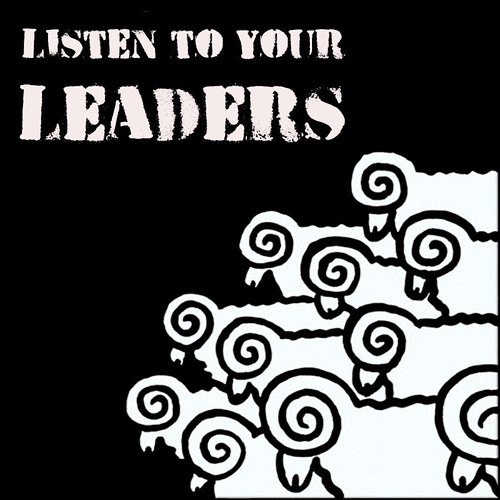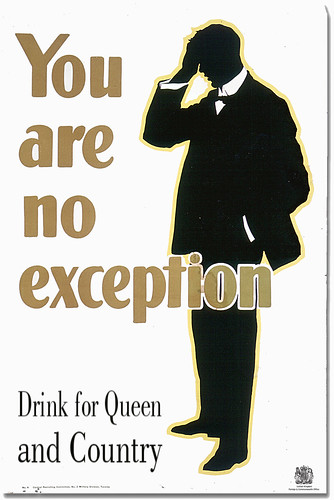Monday, August 30, 2010
Sunday, August 29, 2010
Greek trade unionists picket Fokas department store - Thessaloniki
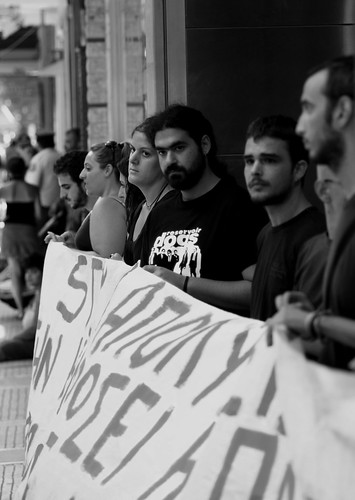
Greek trade unionists picket Fokas department store - Thessaloniki, originally uploaded by Teacher Dude's BBQ.
Greek trade unionists organised a three hour blockade of Fokas department stores across the country in protest against job losses and pay cuts.
According to the the PAME trade union the Fokas chain is using the crisis in Greek retailing to push down wages and fire employees despite a a tripling of profits since 2005.
However, with the economy in free fall the Greek Chamber of Commerce is predicting the closure of 175,000 shops and other small businesses in the near future with the loss of 300,000 jobs.
Two sudden hikes in VAT along with spiralling unemployment and wage cuts across the board have made Greek consumers wary of making purchases at a time when many have no idea if they will still have a job come winter.
Saturday, August 28, 2010
Wednesday, August 25, 2010
Is Greek PM, Giorgos Papandreou the new Gorbachev?
Tuesday, August 24, 2010
Sunday, August 22, 2010
Julian Assange and Daniel Ellsberg - Is history repreating itself?
Friday, August 20, 2010
The Memorandum of Economic and Financial Policies - Greece
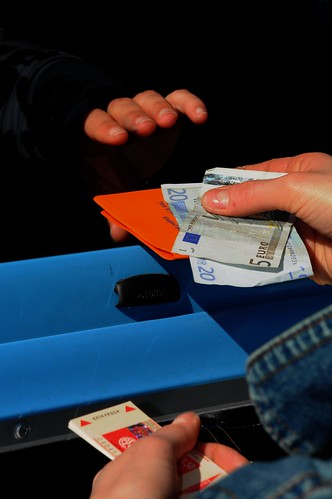
Greeks angry over price hikes in wake of austerity package, originally uploaded by Teacher Dude's BBQ.
"Dear Messrs. Juncker, Rehn and Trichet,
In the attached update to the Memorandum of Economic and Financial Policies (MEFP) and the Memorandum of Understanding on Specific Economic Policy Conditionality of 3 May 2010, we describe the progress and further policy steps towards meeting the objectives of the economic program that is being supported by financial assistance provided by the euro-area Member States in the context of the loan facility agreement.
The policies of the government of Greece remain fully oriented toward securing fiscal sustainability, safeguarding the stability of the financial system, and boosting potential growth and competitiveness.
We have made a vigorous start with our economic program. The fiscal program is progressing well, financial policies are being strengthened, and structural policies are ahead of schedule in key aspects:
The end-June quantitative performance criteria have all been met, led by a strong implementation of the fiscal program. Not unexpectedly, it has proven difficult to fully control expenditures at some entities, and in anticipation of such problems we significantly under-executed budget implementation at the state level, thereby ensuring that targets for the general government were met. Going forward, we are redoubling our efforts to strengthen controls at all levels of government and are determined to continue to over-perform at the state level until such controls become fully effective.
Reflecting the weaknesses in expenditure controls at some entities, the indicative target on the non-accrual of domestic arrears has not been observed as the monitoring system for general government commitments, accounts payable, and arrears is still being developed and implemented. We commit to bringing these arrears down to zero by year-end, so that only a normal level of accounts payable is carried over into 2011.
While the financial system continues to feel the effects of tight liquidity, sentiment indicators are gradually beginning to improve, and policy progress has been made by establishing the Financial Stability Fund to backstop any capital needs that banks might have in the future owing to an expected increase in impaired loans as the
The government has made significant progress in structural reforms with far-reaching pension and labor market reforms being approved ahead of schedule. Parliament has also already adopted important budgetary reform and reforms of local government. Other major reforms that are at an advanced stage aim at liberalizing the trucking industry and restructuring the railroad system, while reforms of the energy sector, protected professions, the licensing and business regulatory framework and preparations for implementation of the services directive are gaining momentum, as foreseen in our program.
On this basis and the completion of the prior action, we request the disbursement of the second instalment of financial assistance by the euro-area Member States in the amount of EUR 6 500 million, in line with the loan facility agreement.
We believe that the policies set forth in the 3 May 2010 Letter of Intent, MEFP and MoU, and the attached updates, are adequate to achieve the objectives under the program. We stand ready to take any corrective actions that may become appropriate for this purpose as circumstances change. We will consult with the European Commission and the ECB, as well as with the IMF, on the adoption of any such actions and in advance of revisions to the policies contained in this letter.
We are copying this letter to Mr. Strauss-Kahn, Managing Director of the IMF."
ENOIKIAZETAI - FOR RENT
As the economic crisis in Greece bites ever deeper more and more of these signs are appearing in shop windows across Thessaloniki, Greece's second largest city. In some neighbourhoods closed down shops now outnumber those still in business.
Rapidly rising unemployment (up 50% in just one year), shrinking incomes and worry about what the future holds means that Greek families are now cutting back on spending in every category including basics such as groceries, a fact that many of my Greek friend swore blind would never happen no matter how bad things got.
With consumer confidence rock bottom and Greece's GDP set to drop 3.5% this year no wonder 86% of businesses are reporting cash flow problems. The Greek Chamber of Commerce is predicting the closure of 100,000 small enterprises before the year is out with the loss of yet more jobs.
Some parents, especially those on lower incomes are even cutting back on the amount they spend on their children's education, a situation that was almost inconceivable a few years back. The conventional wisdom was that Greek parents would make any sacrifice in order to help their son or daughter get the qualifications needed to get on in life.
The problem is that not only do families have far less disposable income than ever before but also there has been the realisation that the degrees and certificates that have been gained with so much sweat, toil and financial outlay are virtually worthless in terms of getting a decent job. The country s full of university graduates who cannot get work of any kind, let alone jobs that utilise their expensively acquired education.
It is exactly this generation that rose up in December 2008 and were at the forefront of the most violent and extensive civil disorder Greece has seen in a generation. However, the economic conditions then seem positively idyllic compared with the prospects now with one in three of 15-24 year olds jobless. No society, especially one as volatile as Greece can stand such levels of anger and hopelessness amongst its young for long.
Last time it was the killing of a 15 year old teens which caused a month long series of riots and confrontations in virtually every urban area nationwide and led to billions of euros worth of damage. One has to wonder how long it will be before another incident sets off the Greece's disaffected youth.
Thursday, August 19, 2010
Greece's richest yet to feel the heat of the economic crisis.
Sometimes there is such a wide divide between the way news about Greece is presented abroad that you might be forgiven for thinking that perhaps the country is like Slovenia, constantly being confused with Slovakia.
Today the BBC had a lead story that the Greece has fulfilled the conditions for the next installment of the massive 110 billion euro bailout package. To judge from the tone of the article all is well in Athens and now it is business as usual.
The fact that the imposition of the IMF/European Union/European Central Bank measures has crippled the economy seems little more than a perplexing footnote. The reality is that virtually every economic indicator is in the red. Unemployment has risen nearly 50% in just a year, 30 billion euros has been taken out of the country's banking system in the last 12 months and tourism revenue has dropped 25% since 2008.
The Greek Chamber of Commerce is also predicting that over 86% of business are facing liquidity problems and that 100,000 are set to close by the end of the year so further hampering government efforts to raise tax revenue in order to reduce the massive deficit.
However, unable or unwilling to take on Greece's wealthiest prime minister Giorgos Papandreou has followed the safe path and hiked up VAT twice in th last few months and pushed up fuel prices over 70% since taking power last September. Such tactics are a stark admission of how ineffectual the Greek state is in taxing the country rich directly. As a result the burden of the sacrifices being demanded is falling disproportionately on the shoulders of theworking and middle class.
At first glance such measures could hardly be considered an easy option for any democratically elected government but the fact that PASOK would rather go head to head with millions of bitterly disappointed voters than challenge the wealth and power of the country's richest inhabitants speaks volumes about how much influence they wield in modern Greece.
Sensing the growing outrage over falling wages, rising unemployment and the huge tax increases PASOK is mounting a propoganda campaign to convince the electorate that the better off are also being called up to pull their weight. Day after day the state run channels, along with pro government newpapers and TV stations are reporting raids on clubs and bars evading tax.
The problem is that most Greek have seen such campaigns so often that they are very cynical about their supposed results. Most believe that even if businesses are caught a quick word/bribe to the relevent official means that the case will quietly be dropped once the glare of publicity has moved on.
On the other hand Greece has pointedly ignored the opportunities for clawing back lost revenue squirrelled away in Swiss bank accounts by refusing to act on information that the French and Italian authorities were quick to utilise in their crack down on tax evasion.
Apparently not one of the 1000 plus Greek customers of the Swiss branch of HSBC was worth investigating. In contrast the Italian tax authorities found several cases of wrong doing among the 5728 Italian individuals and companies with accounts.
Whether SDOE (Greek IRS) was right in making such a call is less important than the message it has sent to the public that while they are being crushed by the current austerity program those with access to wealth are not feeling much pain at all. Protected by their off shore companies and close connections with those in power, Greece's elite are quite happy to ride out this crisis in the comfort of their villas and yachts.
The sad irony is that the measure to raise state revenues are not working the, more Athens raises VAT and other indirect forms of taxation the greater the gap is between the amount collected and that needed. Fears of unemployment, falling incomes and rising prices of basic goods such as bread and power means that people have far less disposable income and what money they do have left over is being hoarded in case of future emergencies. With the economy entering a graveyard cycle it is becoming harder and harder to believe that Greece will be able to halt the decline without a radical reapprisal of its current economic priorities.
Wednesday, August 18, 2010
The A21 Campaign - Human trafficking in Greece
You can also follow the A21 campaign on Twitter and on Facebook Cause and check out their 21 different ways to help.
Saturday, August 14, 2010
Friday, August 13, 2010
Listen to your leaders
As you've probably noticed I've been doing a lot of work on remixing various posters from the past. This is no exception as it was originally a silk screen print created by students in Paris in May 1968 and entitled Retour A La Normale (Back to normal). However, since I have no real drawing skills nor access to any kind of printing device I decided just to produce my own digitally updated version using GIMP (which is an open source version of Photoshop) and my netbook just to see if I could come up with a credible result.
Well, that and the fact that I'm bored stuck in the city in the middle of a heat wave and sitting in an air conditioned cafe doing anything has to be preferable to sitting at home sweating myself into a feverish frenzy.
Sometimes I go through phases when I do not feel like taking photographs or there are no subjects that really grab my attention. This is one of those times and rather than do nothing I usually focus on some other interest such as writing or designing. The good news is that by doing something different for a change I usually manage to pick up some news skills which often prove useful later on in ways I never expected. For example by working on images such as the one above I have to overcome a number of techincal problems which can be frustrating at times yet when I have overcome them they open up new avenues with my photography.
Usually, I get inspiration from something I've read or heard about in the news, often something that has enraged or upset me and then the germ of an idea is born which may take days or weeks to develop into something I can actually visualise. Other times it just appears in amtter of minutes, there is no way of telling.
Wednesday, August 11, 2010
The world gets a new super hero - IMF Man
Step aside Superman, give it up Spiderman, Batman, time to hang up the cape. There is a new kid on the block - IMF Man.
Able to destroy large economies with a single leap in interest rates, IMF Man is here is here to save the world from depravity and unwarranted public spending. See him crush trade unions with the swish of a pen and bail out out the entire banking system single - handed.
Bitten by a radioactive coackroach when young mild mannered Dominque Strauss - Kahn is a mild mannered finance specialist by day but by night he is a neo-liberal super hero fighting the evils of deficit spending wherever they rear their ugly head.
Targeting benefit thieves
If you suspect benefit or tax fraud please contact your local Coalition of Resistance representative.
Tuesday, August 10, 2010
Live your myth in Greece
Back in the day when I could still afford to travel to the Greek islands I would often read and hear stories about how tavernas and restaurants would have two different sets of menus, one with prices for foreign tourists and another set for Greek visitors. The owners would use the fact that many holidaymakers from abroad found it difficult to get used to paying in thousands of drachmas rather than tens of francs or marks.
It also reflected the fact that then the gap in earnings bewteen the average Greek and northern European was enormous, something that came as a shock when I first came to Greece and realised that the summer job I had had as a lowly clerk paid more than a fully qualified doctor was earning here.
With the passage of time the gap in earnings between the groups has narrowed, though it should be added not disappeared and yet strangely the same system of differential pricing has become inverted with Greeks shelling out far more for their holidays than tourists from other countries. A friend of mine told me that she could save money if she took a charter flight to London and then Rhodes than book a holiday direct via a travel agent here in Thessaloniki.
Unable to squeeze more money from the tour operators hoteliers charge outrageous rates to their fellow countrymen and women, hoping to get the same kinds of profits as in the past, even though the local holiday season has shrunk dramatically as the cost of vacations has risen exponentially. Now the Greek family that spends two weeks at a hotel or pension is the exception rather than the rule. This does not mean that people are not going on holiday but rather the nature of holiday making is changing with more and more people choosing to stay with family or friends or taking a week off rather than the traditional two or three.
There are a number of reasons for this and first and foremost is the current economic crisis which has forced Greeks to think very carefully about how and where they spend their money. With the threat of job losses hanging over everyone's head many are choosing not to spend money unless absolutely necessary.
The Greek trade union congress, GSEE is talking about a million out of work within the year, or approximately one in five of the work force nationwide. Not than unemployment is ever evenly spread and here in the north of Greece that figures is set to be much higher, especially in the towns and cities hit by loss of textile and other manufacturing jobs to other Balkan states and, of course China.
On the other hand tourism in Greece has been in a downward spiral for a number of years weighed down by rising prices which have deterred both foreign and domestic visitors from staying longer. Even those visitors who can take advantage of cheap flights and accomodation are often shocked by the prices of eating out and entertainment which are far greater than at home. How many residents of Dusseldorf, Dieppe or Doncaster think that that 4 euros is a reasonable prices for a cup of instant coffee is open to debate. This is a far cry from the 80's and 90's when even the inflated prices charged in the tourist hot spots were still comparatively cheap for northern europeans.
Chatting with friends recently returned from the island of Kefalonia they told stories of shocked vistors amazed that despite the fact that Greece is in the middle of its worst financial crisis in a generation prices were still so high? When people have no money are they supposed to drop? Apparently not. Adam Smith is obviously not required reading on the beach.
Yet when you talk to the owners of these places they are adamant that the only way they can survive is by charging more and more, so making up in profit margin what they are losing in sales volume. And so the vicious cycle goes on with the holiday season growing ever shorter and prices ever higher as those involved in the tourist industry try to squeeze more and more money out of visitors in the quickest time possible.
Monday, August 09, 2010
Drink for Queen and Country
Foreign and Commonwealth Office claim full disclosure of £864,000 collection could 'influence the wine market'
Saturday, August 07, 2010
Happy birthday Lydia
She's now 11. Or 12 as they sometimes calculate it in Greek. I can still remember the first time I picked her up in my arms, terrified that I would break her or drop through fright.
Friday, August 06, 2010
Blair must be arrested by John Pilger
"Having helped destroy other nations far away, our former prime minister — “peace envoy” to the Middle East — is now free to profit from the useful contacts he made while working as a “servant of the people.
Tony Blair must be prosecuted, not indulged like Peter Mandelson. Both have produced self-serving memoirs for which they have been paid fortunes; Blair's, which have earned him a £4.6m advance, will appear next month.
Now consider the Proceeds of Crime Act. Blair conspired in and executed an unprovoked war of aggression against a defenceless country, of a kind the Nuremberg judges in 1946 described as the "paramount war crime". This has caused, according to scholarly studies, the deaths of more than a million people, a figure that exceeds the Fordham University estimate of deaths in the Rwandan genocide.”"
The Greek economic crisis's 600lb gorilla in the room
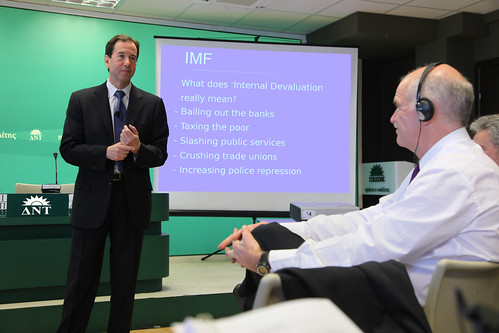
IMF - What "Internal Devaluation" really means for Greece., originally uploaded by Teacher Dude's BBQ.
I'm sure than you have that old medical joke, "the operation was a success but the the patient died" a thousand times but I can't help but recall it when I see on the state - run ET1 and NET news bulletins reports of how quietly optimistic the IMF/EU/ECB are about the progress Athens has been making in implementing the economic reforms needed before they approve the latest installment of the bailout package.
NB the picture is NOT real but a piece of photoshopped fun. Just a reminder for those who had their sense of humour removed instead of tonsils when young.
Wednesday, August 04, 2010
Tuesday, August 03, 2010
Papandreou's perfect storm gains strength

Reading some of the foreign media accounts you could be forgiven for thinking that the Greece's embattled prime minister, Giorgos Papandreou has weathered the worst of the storm caused by his attempts to bring in the country's ballooning public debt under control. The mass public protests that rocked Athens and other Greek cities throughout May have stopped, the truck drivers' unions have called off their strike and the PASOK government is rapidly pushing through the changes being demanded by the IMF/EU/ECB troika in return for the next installment of its bailout package.
Monday, August 02, 2010
Laughing all the way to the bank
I took this picture of Giorgos Papandreou just after a PASOK campaign rally in Thessaloniki last year during the Greek parliamentary elections.
Instead of adoring party supporters the next time he appears in the city in September he will most probably be acompanied by 5 - 10,000 extra police officers to ensure that he and members of his cabinet are not attacked by the very people who voted for him just one year ago.
IMF Chaos and poverty world tour T-shirt
Sunday, August 01, 2010
Welcome to the Afghan War Diaries
At long last the Afghan War Diaries has brought to the attention of those countries that have forces stationed in Afghanistan what exactly are the real consequences of waging a nine year war. We no longer have the fig leaf of ignorance to hide the fact that we who live and vote in these nations also are culpable in the deaths of hundreds of thousands, the majority of whom were guilty of nothing more than being poor and powerless.
For years we have all placidly sat by and lapped up the white washed "news", neatly sanitised for our own protection that has come out of Afghanistan. Murderous attacks on unarmed villagers have regularly been mutated into glorious battles between the forces of democracy and supporters of a barbarous ideology whose way of life threatens us all.
It's hard not to see the echo of high imperial thinking in such rhetoric, especially when it comes from the UK press whose ancestors were quite happy to forgive any "mistakes" by the guardians of Empire, safe in the knowledge that The gift of Civilisation to the heathen was worth the sacrifice of lives in the long run.
On the other side of the Atlantic the US media has been not just willing but positively enthusiastic about "supporting out troops" in their war on darkness, happy to burnish the military's view that the best way to save the people of Afghanistan is slaughter them in ever larger numbers. The lessons of Vietnam have been condemned the dustbin of history, seemingly no more relevent to today's world than the speeches of Cicero or buggy cabs.
For years publications such as Time have been running stories on how US soldiers have run mission after mission to thwart insurgents and win the hearts and minds of locals who wish to live in peace. The message being that any group that opposes such goals has to, be definition be either fanatical or evil, preferably both. So stories of widespread abuse of human rights, summary executions, death squads and thousands of deaths "by mistake" cannot be made part of the media landscape, they make no sense and so contradict the perceived consensus that they are either ignored or downgraded in importance.
One has has just to look at these two magazine covers to understand how little has changed in the way the majority of the US mainstream media deals with conflicts that involve their own soldiers. Despite a gulf of nearly four decades the media has learnt little and once again is more than willing to acquiesce in any act of moral appeasement in the name of patrotism and access.

